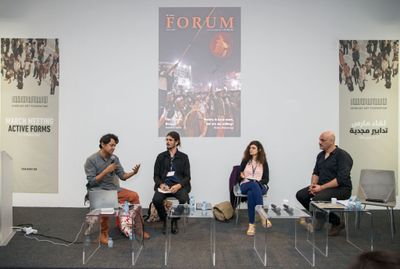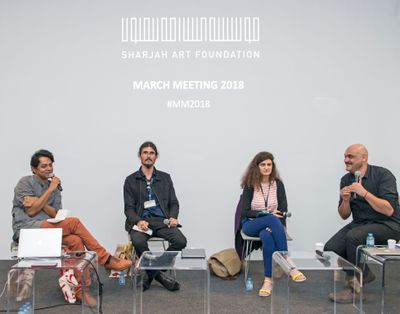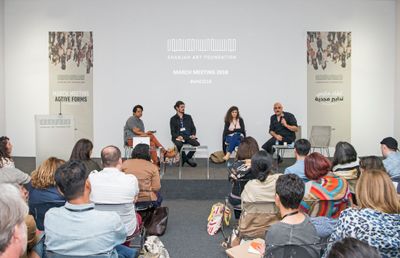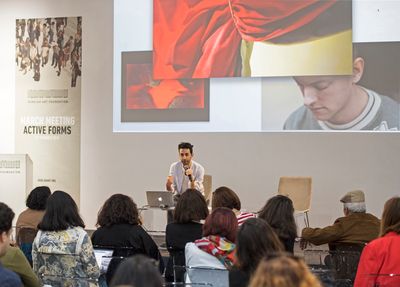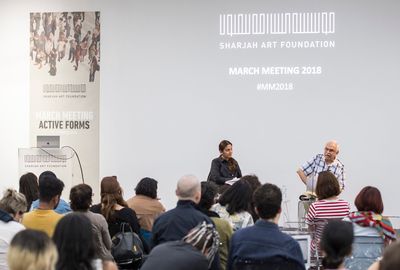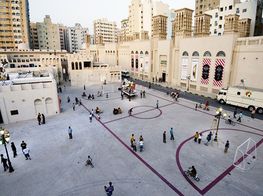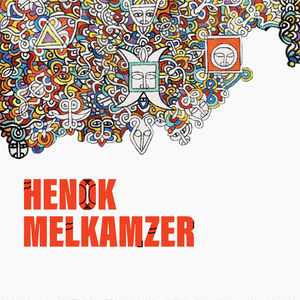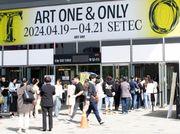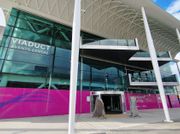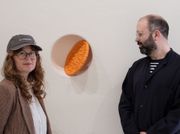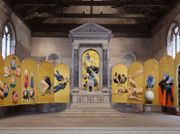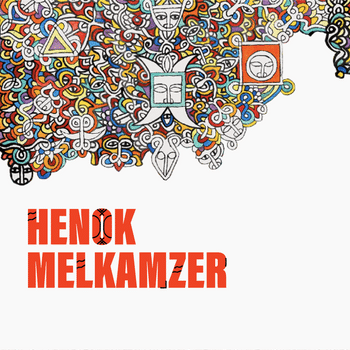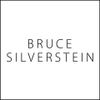Active Forms: The 2018 Sharjah March Meeting
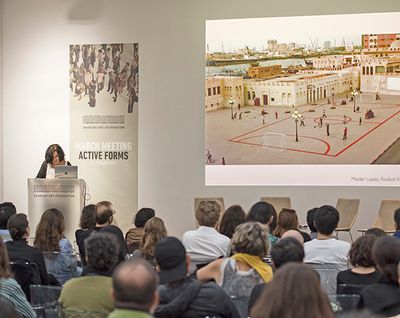
Mona Al Mousfi, 'Structural matters'. Presentation at March Meeting 2018: Active Forms, Sharjah (17–19 March 2018). Courtesy Sharjah Art Foundation.
The Sharjah Art Foundation's March Meeting 2018: Active Forms (17–19 March 2018), explored the field of art and cultural production as an active, networked site of engagement and (re)formation. The three-day event of panels, lectures and performances, which were held in the main Sharjah Art Foundation venues, explored how socio-political urgencies and activist impulses have shaped artists' work, and how forms of making or producing art have activated new ways of thinking and acting collectively. Looking to artistic, cinematic, architectural, spatial and discursive practices, the Meeting was driven by two central questions: How does 'organising enable us to conceptualise resistance as not only a practice of "standing against" but also one of ongoing exchange and future planning?' and 'How might such thinking help us reassess art's relationship to notions of authorship, agency, power and the public?'
By offering resistance as a starting point, a range of encounters—from discussions about keeping the voice of indigenous groups visible within state-sanctioned exclusionary policies, to visual culture's role in countering a (neo)colonial order—emphasised artistic practice as a site of agency and collective action.
The Meeting's first day explored questions of mobilisation. It began with 'This is not a programme', which explored forms of social and political organisation through the work of Sally Mizrachi, co-founder of non-profit artist-run organisation, Lugar a Dudas in Cali, Colombia; Alper Turan, co-founder of independent curatorial initiative, DAS Art Project, based in Istanbul, Turkey; Sharmini Pereira, founder of non-profit independent publishing organisation, Raking Leaves in Colombo, Sri Lanka; and architect Abir Saksouk, from Public Works in Beirut, Lebanon.
Moderated by curator Zeynep Öz, each panelist represented an initiative that actively engages in the public realm by working with communities. The panel began with Saksouk, who described Public Works as a collective that brings together architects, designers and urbanists to counter the effects of urban inequalities and architectural exclusions wrought by privatisation and state withdrawal. The team works with disenfranchised groups, including those impacted by the recent rent law passed by the Lebanese government that evicts tenants from their homes to make way for real estate developers. Offering legal and social support, Public Works actively informs residents of their rights to their city by producing articles, videos and organising meetings, where discussions become the basis for future policy changes and political demands.
Though specific to the context of Beirut, Saksouk's presentation shared a concerns about accessibility with others on the panel, including Pereira, who introduced the reason for setting up Raking Leaves in 2008: to make art more accessible to communities who are unaccustomed to entering the elite space of the art gallery. Pereira turned to publishing books that would showcase artists from Sri Lanka and South Asia, who in her view have been underrepresented within global institutional spaces. Pereira drew on Benedict Anderson's notion of imagined communities, and discussed the role of print culture in connecting and establishing a 'collective consciousness'. She also referenced the production of artist books in the 1960s and 70s created with political goals in mind, from espousing anti-war sentiments to questioning the art-world's exclusionary institutionalism—including Printed Matter Inc., the largest distributor of publications made by artists that was founded in 1967.
The collective processes involved in the labour of production, and the ability of artistic practice to transcend geographical borders by establishing a shared cultural and political consciousness, were common themes throughout Active Forms. The panel 'Terms of Order', which included presentations by artists Naeem Mohaiemen, Marwa Arsanios and Dale Harding, looked to collaborative practices of knowledge production. Moderated by curator and architect Tarek Abou El Fetouh, it began with Arsanios' discussion of Beirut-based initiative 98Weeks, founded in 2007 (and currently on pause) as a collaborative learning process run by artists and writers. Arsanios cited various research initiatives that the collective undertook, which each lasted 98 weeks. These included an inquiry into the city's spatial practices, as well as research into notable Arabic publications produced in the 1960s and 70s, whose contributors were mostly men and whose findings led to a pan-Arab Feminists project.
In her talk, Arsanios also articulated how the research that 98Weeks developed informed her own artistic practice, with a loose description of how these methodologies of collective knowledge production translatedinto her individual artistic exploration. This reflection touched on the fact that collective labour often remains invisible in artistic practice—a notion that was expanded in the 'Terms of Order' panel with a highly affective presentation by Harding, a Brisbane-based artist who is a descendant of the Bidjara, Ghungalu and Garingbal peoples of Queensland. Noting the familial bonds and cultural inheritances that drive his contemporary arts practice, namely the Aboriginal tradition of rock painting (or stencilling) as 'a process of doing and thinking', Harding's work seeks to bring his community's visual expression into contemporary art spaces: a response to how aboriginal cultural expression has been suppressed under state legislation designed to disseminate and dislodge communities from their wider context.
In his talk, Harding considered the art world a field where excluded communities, along with their inherited images and experiences of trauma, can be embedded within broader cultural frames. By inserting aboriginal art practices undertaken collaboratively with family members into the gallery space, inherited and shared cultural lineages find a position within broader contemporary practices: a reflection on how to make invisible labour more visible by focusing on the process and intentions of art-making.
The final presentation of 'Terms of Order' was Mohaiemen's discussion of South Asian publications and other community spaces established by and for the diaspora community in America. He discussed the format of print magazines (and later the shift to digital platforms) through the publication SAMAR—whose activist-driven acronym stands for South Asian Magazine for Action and Reflection—and Asian underground nightclub and exhibitionary platforms within the American context, which brought diasporic subjects from within the South Asian community together and (unintentionally) became a breeding ground of ideas and academic inquiries that linked artists, cultural workers, academics, writers and lawyers. Central to this presentation were the rhizomatic connections between the South Asian community at home and the diaspora, and the various ways of organising that included linguistic, trans-national, cultural and political negotiations.
In the conversation that followed, El Fetouh invited audience members to consider the term Global South, which Mohaiemen acknowledged as imperfect, specifically in relation to a shift away from discourse around the concept of the 'Third World'. He offered an understanding of the term as one 'of power' linking movements in 'the non-West' that are 'connected to movements within North American and Europe', creating new connections among communities without 'papering over the differences'. Though the discussion did not reach a neat conclusion, it considered the complexities of trans-national political alignments in relation to class, geographical borders, diasporic movements and global anti-capitalist protests.
The second day focused more heavily on cinematic practices, ranging from revolutionary cinema and its central role in mobilising political resistance, to curated film practices that seek to make independent and art cinema more accessible to audiences. Artist and filmmaker John Akomfrah's conversation with Reem Shilleh of Subversive Film, moderated by artist and writer Ala Younis, looked at the role of the militant image and 'cinecultural' legacies. Reflecting on the temporality of the archive, Akomfrah claimed that 'the promise of the image is its claim for immortality'. The presence of the image, at whatever point in the future it is found or displayed, survives the ruptures of the past to be re-articulated and reflected upon in the present—the necessity to historicise opens up connections that may translate into new forms of collective action. This point was effectively illustrated by the work of Subversive Film, which restores the legacy of Palestinian revolutionary cinema released through the Palestinian Liberation Organisation's Film Unit—the cultural arm of the revolution—by re-contextualising revolutionary archival material.
One of the Meeting's most impassioned talks occurred on the second day in a discussion between Salah Hassan, Goldwin Smith Professor and Director, Institute for Comparative Modernities at Cornell University, and Manthia Diawara, Professor and Director, Institute of African American Affairs at New York University. Hassan began by introducing Diawara, 'a pioneer of African cinema in the United States', and honouring Diawara's commitment to the Black intellectual tradition, namely through two influential books, In Search of Africa (1998), an intellectual biography of the continent, and We Won't Budge: An African Exile in the World (2003), which Hassan described as 'an autobiographical account of [Diawara's] journey as a young man through Mali then moving to Paris and ending in the United States'. Hassan praised Diawara's influential academic writings, and noted his shift towards engaging documentary making as a form of praxis, which grappled with representations of Africans on film.
Through this homage, Hassan addressed the historical and cultural links between pan-Africanism and pan-Arabism—a link that has fluctuated, or has even been underplayed, at various points throughout history. Projecting a series of images in the background, Hassan positioned Black culture as a modernising force in the Arab world, with its influence on hip hop, Arab-futurism, and anti-colonial struggles, which are now reemerging in cultural and activist discourses.
Hassan's engaging introduction set the tone for Diawara's talk that followed, which started by building on Hassan's contextual overview. Speaking about his (auto)biographical approach to writing, Diawara talked about his attempt to find his authentic voice beyond the Western-formulated academic structure. Influenced by Frantz Fanon, Gamal Abdel Nasser and the 1969 Pan-African meeting in Algiers, Diawara's writing became, in his words, an attempt 'to link my voice to other people's voices'. Peppered with humourous and humbling anecdotes, the ensuing conversation led to Diawara's practice, including a discussion around his 2010 documentary Édouard Glissant: One World in Relation, and his most recent documentary shown at documenta 14, An Opera of the World (2017), which extends the theories championed by Glissant, and offers a sober reflection on today's mediatised refugee crisis and the history of migrations between Africa and Europe. Diawara ended with a reflection on how 'immigration has always been there from the beginning of the world', which has 'become politicised, to underplay the notion of hospitality', concluding with a reference to Glissant, who said the future doesn't belong to those who guard the world's borders.
The turn towards futurism as an imaginative way to re-conceptualise or think beyond boundaries of space, was further explored in the panel 'You Send Me', which included presentations by artists Monira Al Qadiri, Almagul Menlibayeva, Larissa Sansour and Martine Syms. Artist and academic Ayesha Hameed moderated, introducing the panel with a brief outline of her upcoming project Black Atlantis, a series of lecture performances that look at the history book The Black Atlantic (1993) and its afterlives 'in illegal migration at sea today, in oceanic environments, through Afrofuturist dancefloors and soundsystems, and in outer space'. In response, each speaker presented their approach to futurity taking into account their respective cultural contexts of the US, Kuwait, Palestine and Kazakhstan. Sansour played excerpts from two of her short films Nation Estate (2013) and In the Future They Ate From the Finest Porcelain (2015), both of which grapple with the notion of how history gets translated and the role of fiction, as both a falsifying and emancipatory strategy. She talked about how science fiction offered a way to reframe and 'reactivate' the dominant visual expression associated with Palestine and to acknowledge what she described as exploring 'the blurry line between fact and fiction'.
This concern with fiction as a terrain of freedom and revolt was revisited on the third and final day of the March Meeting in a lecture by researcher and curator Daniel Blanga Gubbay, titled 'Dance under cover of a fictional rhythm'. In his presentation, Gubbay spoke about fiction as 'a political tool and an active form' of subversion that allows for complexity and nuance to coexist—a strategy that frees the narrative from being 'domesticated into a single narrative'.
Broadly focused on textual and material infrastructures, day three looked at art publications and spatial practices that disrupt dominant models of control and access. Artist and practitioner Rasheed Araeen, discussed the art journal Third Text, which he founded in 1987. The journal sought to open up new authorships and perspectives, and to use writing as a tool to circumvent what Araeen called the 'colonial mindset of Western institutions'. Prompted by pertinent questions from Sharjah Art Foundation researcher Saira Ansari, Araeen spoke about the early 1970s, when barely any artists from Africa, Asia, or Latin America were included in biennials and exhibitions in the Western world, and were absent from critical or historical discourses. Thus, Araeen established Third Text, which evolved out of the first publication he founded in 1978, Black Phoenix, to create a space for new writing and analysis that side-stepped the dominant colonial order of the art world system at the time.
During the question and answer session that followed Araeen's talk, an audience member asked how art writers might continue to resist within a contemporary art context where representational inequalities persist, even if there has been an improvement in the inclusion and visibility of non-Western artists. In response, Araeen spoke about how resistance within the global art world today has become suppressed, since market success has resulted in artists 'no longer resisting the colonial order' and 'becoming functionaries' instead—an issue he described as 'extremely complex'. Offering a cynical yet crucial point of reflection, he pointed to the difficulties of navigating the (neo)colonial order of the contemporary art world, and the nuances therein—an issue that was echoed throughout the March Meeting. Indeed, if 'organising' carries its own hierarchies and exclusions, how can artists navigate this highly politicised space, and how could the art world as a space of privilege ever become a critical site of agency?
In the absence of a clear answer to these questions, Active Forms nevertheless made space for such discourses to be 'present' within a networked community, beyond imposed registers and boundaries, and looked to different strategies of art-making while challenging established discourses. As Araeen warned, when 'freedom of imagination is suppressed it becomes an obstacle in the realisation of art'. Thus, the drive to resist whatever creates these obstacles, in order to 'produce new ideas in the interest of society as a whole', is resistance. —[O]

